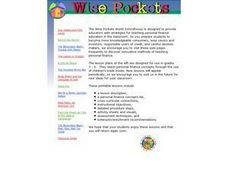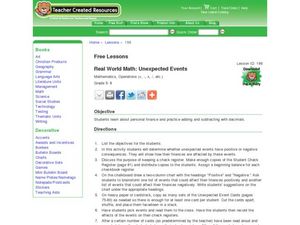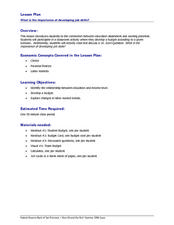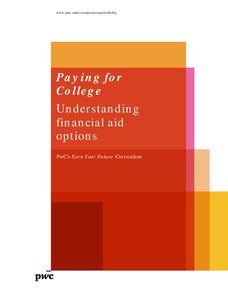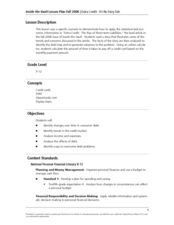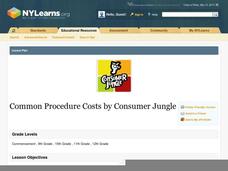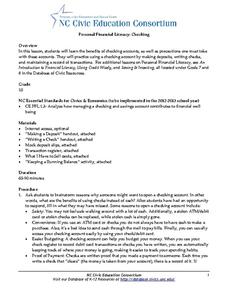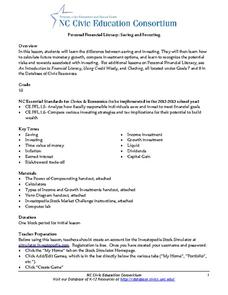Curated OER
Money Math Lessons for Life
An outstanding instructional activity on financial literacy is here for you. Learners are presented with six scenarios, then compute the amount of savings they will have in their accounts. They complete a series of exercises designed to...
PwC Financial Literacy
Planning and Money Management: Spending and Saving
Financial literacy is such an important, and often-overlooked, skill to teach our young people. Here is a terrific lesson plan which has pupils explore how to come up with a personal budget. They consider income, saving, taxes, and their...
K20 Learn
What Is It to Be Financially Literate?
What does it mean to be financially responsible? Develop a working definition of financial literacy with your classes. Using six scenarios, learners debate financially literate actions and develop a definition based on their decisions.
Curated OER
Wise Pockets
Using children's picture books and role-playing activities, youngsters begin to learn about personal finance management. These lesson plans are engaging and intend to endow pupils with skills for making wise decisions with money as they...
Curated OER
Marriage and Financial Goals, Budgeting Strategies
There is no more useful life skill to learn than budgeting and setting financial goals. It's math that is used by every person, everyday. Learners examine the responsibilities and costs involved in family economics. Through a series of...
Curated OER
Real World Math: Unexpected Events
Ready to delve into personal finance? Learners discover how to organize a check book register. They practice debits and credits in a math game involving the register they set up. While they gain valuable practical knowledge, they also...
Curated OER
Money Management Part I: Money and You: An Introduction to Money Management and Budgeting
Learners discuss personal finance and create personal budgets. They discuss the importance of managing their money and how money management skills impact their future. Note: This lesson is intended for use with a SMART Board and...
Curated OER
Money Management Part III: Savings Accounts and Cash vs. Credit
Help your class understand the importance of saving and managing their money. Here is part three to a unit on credit, cash, and savings. Learners discuss savings accounts and the idea that a budget plan can help them avoid costly credit...
Curated OER
What is the Importance of Developing Job Skills?
Financial literacy is the way to teach! The class works in small groups to discover the relationship between education and income level. They use their math and problem-solving skills to complete two different activities. They work out a...
EngageNY
Markup and Markdown Problems
There is a 100 percent chance this resource will help pupils connect percents to financial literacy. Young mathematicians use their knowledge of percents to find markups and markdowns in financial situations in the seventh segment in a...
Federal Reserve Bank
Financial Goals
Do you have financial goals? How will you make them happen? Help your pupils answer these questions through this interactive project. They create goals and a plan for reaching them as one of many high school algebra projects.
Federal Reserve Bank
Important Financial Documents
Emergencies usually come by surprise — preparation is key. Help to reduce anxiety of the unknown by having a financial plan in place for when they arise. Important documents are gathered and action plans are documented.
Curated OER
Family Finances
Students examine the dynamics of family finances. In groups, they discuss the importance of a budget and create their own given a fictional amount of money. As a class, they listen to a speaker from the bank discussing the importance of...
Youthlinc
Financial Literacy: Money Attitudes Lesson Plan
Going once, going twice, sold! An auction provides class members with an opportunity to examine their attitudes toward money. After bidding on and purchasing items, individuals complete an attitude survey and then identify a...
Curated OER
Calculating the Cost of Living
Bring Consumer Mathematics and Economics to life with this instructional activity, where learners investigate personal finance and budgeting. They use the newspaper’s classified section to determine a future job and potential earnings...
PricewaterhouseCoopers
Paying for College: Understanding Financial Aid Options
With many options to pay for college, middle schoolers learn about each possibility and that continuing their education is worth the investment. They discover the difference between a grant and a loan and that some expensive...
Federal Reserve Bank
Lesson 3: A Fresh Start
The members of your economics class may be busy earning graduation credits, but the credit they should be concerned about is their financial credit. The third lesson plan in a unit about Hurricane Katrina and other events that can result...
Curated OER
Extra Credit: It’s No Fairy Tale
Students discuss their knowledge of payday loans and credit cards. In this Economics lesson, students complete a read an article and Q&A activity in groups, and play a vocabulary bingo game and a quiz game on payday loans. Students...
Curated OER
My Credit Card Plan
Remember all those credit card tables lined up on your college campus? So alluring and dangerous, if you don't know what you're doing. Prepare your pre-college attendees for life by offering a lesson on credit management. They discuss...
Curated OER
Common Procedure Costs
Kids never think about the cost of medical expenses, because they never think they'll get hurt. To better understand personal financial planning, learners research common medical procedures and their costs. They use a worksheet and the...
Carolina K-12
Personal Financial Literacy: Using Credit Wisely
What is credit, and what are its advantages and disadvantages for purchases? Your class members will learn about different types of loans, such as student and mortgage, how interest factors into credit use, credit reports, and ultimately...
Center for Literacy and Disability Studies
Personal Financial Literacy: Checking
After researching local banks and the checking account benefits offered by each, class members practice filling out a deposit slip, writing a check, and keeping a transaction register.
Carolina K-12
Personal Financial Literacy: Saving and Investing
When should you save, and when should you invest? In considering this question, your class members will also learn about the time value of money, inflation, compounded interest, and income/growth investments. The resource also outlines...
Visa
Credit
What are the advantages and disadvantages of having a credit card? Don't miss this important life skills and financial literacy lesson plan, which focuses on consumer responsibilities, creditworthiness, and establishing a credit history.





